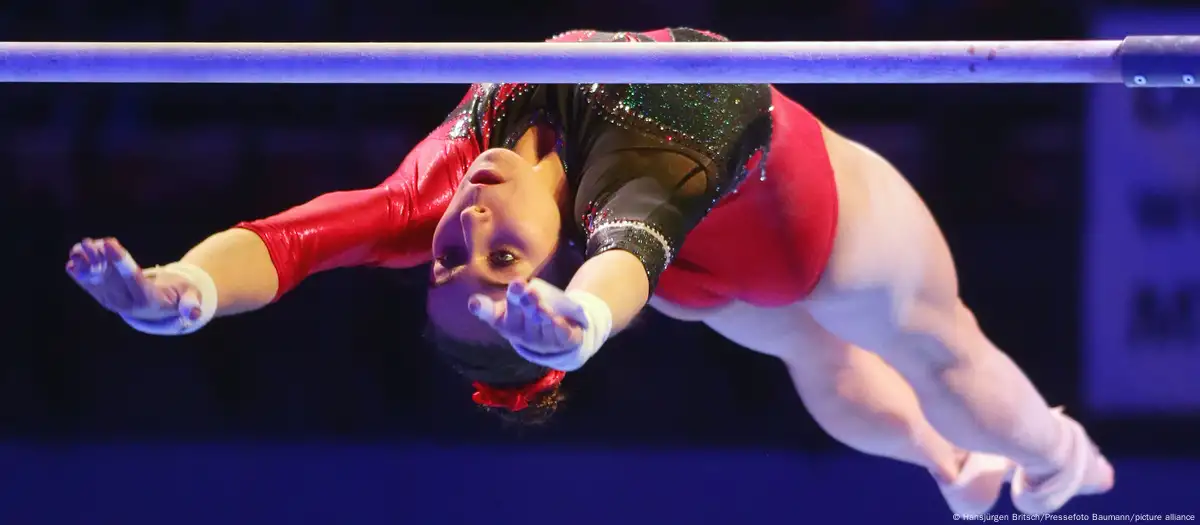Female athletes have made serious allegations against coaches at the national training center — and Germany’s gymnastics federation.
What accusations have been made?
On December 28, former elite gymnast Tabea Alt used her Instagram account to go public about abuse she said she experienced at the national gymnastics center in Stuttgart and “in German women’s gymnastics in general.” The 24-year-old wrote that she was even made to perform and compete in Stuttgart while suffering from broken bones.
“It is not an isolated case: eating disorders, punitive training, painkillers, threats and humiliation were the order of the day. Today I know it was systematic physical and mental abuse,” she wrote.
Alt said she had detailed the allegations in a letter to the German Gymnastics Federation (DTB) three years earlier, but nothing had happened as a result. Alt won bronze on the balance beam at the 2017 World Championships in Montreal and ended her career in 2021.
Other gymnasts have echoed Alt’s criticism. Former national team gymnast Michelle Timm wrote on Instagram of “catastrophic circumstances” at the national center in Stuttgart, saying she’d experienced “threats in all contexts” from coaches. Timm said had “trained for months with visible physical damage due to poor medical decisions,” which ultimately led to stress fractures and the premature end of her career.
Lara Hinsberger, an active gymnast, has also spoken out, complaining about the psychological pressure exerted on her as a minor at the national center. She was “willfully broken at the age of 14 due to inconsiderate adults,” the 20-year-old wrote on Instagram.
“In Stuttgart, I was treated like an object. I was used until I was so physically and mentally broken that I lost all value for the coaches [and at some point for myself too].”
How has the German Gymnastics Federation responded to allegations?
The DTB has denied ignoring Alt’s 2021 letter, saying it reacted by, among other things, holding workshops with sports psychologists in Stuttgart.
Regarding the most recent accusations, however, the DTB said in a statement that “the meaningfulness and success of the measures introduced so far must be fundamentally put to the test in a self-critical manner.” It said the federation continued to be guided by “the maxim that we strive for humane competitive sport and that performance must not negatively affect personal development.”
Two coaches at the national training center in Stuttgart have been temporarily released from their duties, until January 19.
How have other gymnasts responded?
“I am on the side of all female athletes who had the courage to go public with their experiences,” wrote Elisabeth Seitz, three-time Olympian and former European uneven bars champion, on Instagram.
Seitz, currently Germany’s highest-profile gymnast, added that “the people who cause them [the alleged abuses] must be held accountable.”
In an interview with Stern magazine, former elite gymnast Kim Bui, now a member of the International Olympic Committee, criticized a system that has “manipulated, humiliated and destroyed” female athletes for years.
“It affects the entire sport of gymnastics in Germany,” she said, accusing many of the people behind the alleged abuses of having protected each other.
Athleten Deutschland, an independent organization representing the interests of German national team athletes established in 2017, has issued a statement demanding that the scandal “be swiftly investigated and dealt with — also in order to prevent continued misconduct and thus potentially ongoing suffering for other athletes.”
The organization said it was confident that this would happen, as the DTB had become “a pioneer for safe and non-violent sport in the German [sporting] association landscape in recent years.”
Are accusations against coaches in German gymnastics new?
No. As early as 2020, other female athletes at the national gymnastics center in Chemnitz made serious allegations against their coach, Gabriele Frehse. According to the athletes, she harassed the gymnasts in training and administered medication to them without a doctor’s prescription. Frehse denied the allegations.
The DTB sacked Frehse, but she won a legal battle over her dismissal and has been working as an Austrian national team coach since 2023.
Have there been any comparable scandals in other countries?
Yes. In recent years, there have been reports of physical and mental abuse in gymnastics in several countries, including the Netherlands in 2020 and France and Switzerland in 2023.
The biggest scandal in gymnastics to date occurred in the United States. In 2017, long-time team doctor Larry Nassar was sentenced to life imprisonment for the sexual abuse of more than 250 girls and women, including Olympic champions such as superstar Simone Biles.
According to the US Center for SafeSport, almost 300 gymnastics coaches in the United States are currently banned or suspended for misconduct.
How important is gymnastics in Germany?
Germany is considered the cradle of organized gymnastics. At the end of the 18th and beginning of the 19th century, the world’s first public gymnastics grounds with equipment were laid out in the eastern state of Thuringia and Berlin. The Hamburger Turnerschaft (“Hamburg gymnastics club”), established in 1818, is regarded as the world’s oldest gymnastics club.
Gymnastics is still very popular in Germany. With around 5 million members, the DTB is the second-largest sports association in Germany after the German Football Association (7.7 million). It not only oversees artistic gymnastics, but also rhythmic gymnastics, trampolining and several smaller sports such as parcours, orienteering and fistball.
The last German Olympic champion in artistic gymnastics was Fabian Hambüchen on the horizontal bar in Rio de Janeiro in 2016. At the 2024 Games in Paris, Darja Varfolomeev won Germany’s first Olympic gold in rhythmic gymnastics.
What does a national sports center do?
According to the German Interior Ministry, there are 193 national centers for Olympic sports and a further 12 in parasports. They are intended to ensure that top German athletes enjoy optimal conditions for regular training, including high-performance training groups and highly qualified coaches.
The centers are generally certified as such for four years — one Olympic cycle. The German government, the state in which any given center is located and the German Olympic Sports Confederation are jointly responsible for issuing such certifications.
There are 12 national centers of the Olympic sports of artistic gymnastics, rhythmic gymnastics and trampolining. One of these is the Kunst-Turn-Forum Stuttgart, which is currently in the headlines.
Each national center is linked to one of Germany’s 13 Olympic training centers. This is where the best athletes go to train for an upcoming Olympic or Paralympic Games. This system is financed by the German government, the country’s 16 states, local authorities, sports federations and corporate sponsors.








